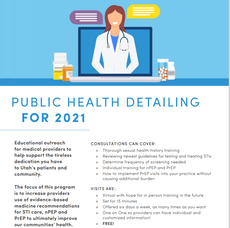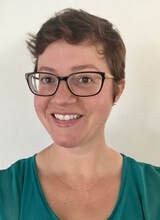|
An interview with Kelsey Genovesse, PA-C, MPAS, Public Health Detailer and Clinician, AIDS Education Training Center (AETC), University of Utah Infectious Disease. The public health detailing program at the AETC is currently focused on expanding pre-exposure prophylaxis (PrEP) throughout the state of Utah and educating clinicians on STI prevention and guidelines for correct treatment. by Anna Morgan, MPH, RN, PMP, NaRCAD Program Manager Tags: Detailing Visits, E Detailing, PrEP  Anna: Hi Kelsey! Thanks for joining us on DETAILS today! Can you tell us a bit about your background, your current role, and your program? Kelsey: I’m a physician associate (PA) by training and previously worked in family practice with underserved communities, including migrant farmworker populations and patients in federally qualified health centers. Our program in Utah is tiny; our AETC only has three or four employees. I do the outreach, schedule the detailing sessions, detail the clinicians, collect the data, and evaluate the program. We’re fortunate that our first year was so successful and we’re looking forward to continuing to expand our program over time. This year, we were even nominated for a Utah Telehealth Education Award! Anna: That’s incredible – what a great accomplishment! Your program is unique in that it started with e-Detailing right from the beginning. Can you tell us a little bit about that?  Utah AETC Utah AETC Kelsey: We attended an in-person Public Health Detailing Institute run by the San Francisco Department of Public Health in partnership with NaRCAD in March of 2020. We had planned to focus on in-person detailing only in Northern Utah because we didn’t have the capacity to drive all over the state. Shortly after we left the training, the pandemic shut everything down and we had to move our program to a virtual platform. We couldn't put the program off because our funding timeline wasn’t changeable, so we gave e-Detailing our best shot. Anna: Your attempt at e-Detailing turned out to be quite successful. Can you tell us more about the nitty gritty of pivoting to e-Detailing? Kelsey: Absolutely. When it became clear that we were moving to e-Detailing, we had to recreate our entire plan. We began with strategizing about outreach to clinicians. Nobody in Utah knows what public health detailing is - this is not a model that has been used here before. We had to get creative about spreading the word about our program. We connected with experts on our topics and clinicians who were already doing a lot of training on PrEP and asked them if they wanted to do a detailing visit with us. This was extremely successful, and we received referrals and warm handoffs to other clinicians from those initial visits. We also used a lot of listservs so that we could contact multiple clinicians at once. We worked with the Utah Department of Health and gave them a flyer we created about our program that was sent to all the clinicians on their listserv. We even connected with local medical groups, like the Utah Medical Association, a PA Association, and a Nurse Practitioner Association. These approaches brought in a lot of clinicians for detailing visits and helped us spread the word.  Anna: Rather than emailing each clinician and sending out hundreds of individual emails, you targeted hundreds of clinicians at once – I love that approach! It sounds like you also had some great AD champions in your network. Kelsey: Yes. I found that I was also doing a lot of e-Detailing sessions with folks who were not clinicians but were involved in the healthcare system in another capacity. I discovered that when I was connecting with these folks, whether it be someone at the health department or a representative from a health-based community program, they were wonderful champions who knew a lot of clinicians. Visits with these non-clinicians also helped spread the word about our program and open access even more. Anna: Many programs have faced challenges when gaining access virtually, but you were able to overcome many of these challenges with your innovative approaches. Has your program faced any other challenges with e-Detailing? Kelsey: We frequently detail clinicians who are short on time. I’ve tried to create a schedule where I have a little bit of availability, almost seven days a week, so that there are more options for clinicians whose schedules are busy. I also try to keep the detailing visits focused on the topics that clinicians are most concerned about. I always send them a comprehensive follow-up email with the resources they've asked for after the visit. Anna: Clinicians’ limited time is a common challenge for detailers—these strategies are helpful to employ when this challenge arises. Do you see specific opportunities with e-Detailing that you wouldn't see with in-person visits? Kelsey: Yes! Within our first year, we connected with providers in rural areas that may have taken us a longer time to gain access to using an in-person approach.  Anna: That’s a great point, especially for a state as large as Utah. Do you envision incorporating any in-person detailing in the future? Kelsey: We’ve had a few clinics that have asked for us to come in person, but as we just discussed, it can be time-consuming. However, there is something to be said about showing up and seeing what a town or clinic looks like in order to understand a community structure better. We’re going to try adding it in in the future. Anna: Being physically present in a clinic can certainly help with assessing the needs of a clinician. You mentioned earlier that within your role you’re not only doing outreach and detailing visits, but you’re also working on your program’s evaluation. Can you share a bit about that? Kelsey: Kristefer Stojanovski, MPH, PhD, the Evaluation Specialist from San Francisco Department of Public Health, has helped us tremendously with our evaluation work. We have pre- and post- surveys for clinicians to fill out with each detailing visit to collect data related to their knowledge around the clinical topic. It has an open format at the end to allow clinicians to request certain information prior to their first visit and leave feedback and comments. I'm hoping that as our sample size increases, that the data starts to look a little bit more robust. At the end of last year, we also sent an email asking clinicians to give us feedback on how they felt their experience was and if they felt like this was a program that was worth continuing. At least a third of our detailed clinicians sent back responses, and all of them were very positive. Most of the feedback reflected on how useful the information was when it was tailored and directed to their personal practice. A couple of clinicians noted they felt they were practicing to the standard on the topics, but detailing helped them gain knowledge they were unaware they were missing. It was nice to see that folks felt that it was useful. Anna: We’re excited to hear more about your evaluation as you gather more data. We'll wrap up with our final question: what’s one piece of advice you'd give to other programs that are just starting out, specifically with e-Detailing? Kelsey: Be flexible in your approach – group detailing sessions or detailing sessions with non-clinicians can be extremely effective, and can lead to 1:1 clinician visits. Also, stay organized! Keep track of who you're reaching out to and who you're following up with. Having all that information tracked over time will help with your evaluation down the road. Anna: That's fabulous advice, Kelsey. We’re looking forward to continuing to watch your program grow and succeed! Have thoughts on our DETAILS Blog posts? You can head on over to our Discussion Forum to continue the conversation!  Biography. Kelsey Genovesse is a Physician Associate with the AIDS Education Training Center and University of Utah Infectious Disease Department. After eight years in underserved family medicine Kelsey started the Utah Public Health Detailing Program to expand support and education to providers throughout the state of Utah on evidence based practices surrounding STIs and PrEP. She also provides care in the Free HIV PrEP Clinic with the University of Utah offering in person and virtual services to help expand access to HIV Prevention throughout the state of Utah, specifically to those without insurance. In June 2021 she was Nominated for a Deborah LaMarche Telehealth Excellence Award for her work with the Utah Public Health Detailing Program. Comments are closed.
|
Highlighting Best PracticesWe highlight what's working in clinical education through interviews, features, event recaps, and guest blogs, offering clinical educators the chance to share successes and lessons learned from around the country & beyond. Search Archives
|

